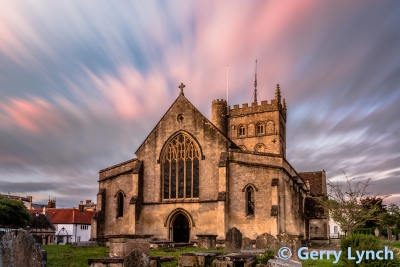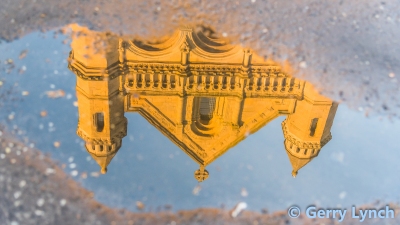On Saturday last, I should have made a deacon in Salisbury Cathedral, a place I love, the antepenultimate milestone in a journey to fulfil a call to priesthood in the church of God that I began, depending on how one counts it, either six, ten, or twenty-two years ago. I first went to see the Director of Ordinands for the Diocese of Connor and joined the Fellowship of Vocation there in September 1998. I often find it useful to date moments in my life by the pop songs on the radio at the time; the UK Number 1 single then was, with delicious irony, T-Spoon’s Sex on the Beach. That really was a long time ago now.

St John the Baptist Church, Devizes, 1 July 2020, © Gerry Lynch
Having been formally licensed as a lay worker in the parish of St John with St Mary, Devizes, by the Bishop of Salisbury via videoconference on Sunday I am, however, a curate if not a cleric, an officially licensed tender of God’s garden of souls at a time when churches have not held public worship for more than three months, when public health regulations have quite correctly banned visiting the army of lonely and isolated people in their own homes. Hundreds of others have had their ordinations similarly delayed, and are experiencing similar uncertainties. For me, a journey towards ordained ministry that often involved being told that I was an awkward person on the edge leads to a public ministry that begins in a virus-ravaged world that sits on the edge of… who knows what?
Wikipedia tells me that in anthropology, liminality (from the Latin word limen, meaning ‘a threshold’) is the quality of ambiguity or disorientation that occurs in the middle stage of a rite of passage, when participants no longer hold their pre-ritual status but have not yet begun the transition to the status they will hold when the rite is complete. Liminality is terribly fashionable in the Church at the moment; I have not always found it to be a pleasant or rewarding place to inhabit. It is, however, the state in which the whole world waits for a new order to emerge, groaning for better but often in trepidation of worse.
Liminal time exists in the cracks in our lives and the cracks in the life of the world that lie between the passing of the old and the coming of the new. Of course, there are other ways of looking at the world, ways that emphasize the continuities rather than the discontinuities. Emphasising the continuities that lie across all breaks in human experience seems to have been the most modish approach of late. Understandings that emphasize continuity bring richness and insight, for each of us always remains himself and all of us always remain human. Like all perspectives, however, these are limited. Just as a photographer will choose his perspective depending on the time of day and year, weather conditions, subject matter, and the like, sometimes we must consciously open ourselves to new viewpoints on ourselves and our world.
In times of stability, we gain insight from perspectives that emphasize continuity and similarity; in liminal time, we gain insight from acknowledging that great sea-changes do occur every once in a while. There are indeed Damascene events that forever divide things into before and after. Usually, they occur only once the old order has exhausted itself. The conventional way of understanding the original Damascene moment seems to presume that Saul was shaken out of deeply held convictions by the blinding light that is Truth; I think that presumes too much, for it was already hard for Saul to kick against the pricks. For the most part, a crisis merely crystallises and brings into sharper focus elements that were already present. The old ways had already become a source of discord and discomfort to Saul, yet he seems to have remained trapped within those frameworks, perhaps because he saw no alternative to them but a sort of internal anarchy. In that, Saul is something of an everyman, for rare indeed is the courage to discard what is worn out before there is something already in existence to replace it with. It takes profound humility to acknowledge the transience of most of what we take for granted, to admit that the only open paths lead to unknown destinations by winding routes.
Yet it is only through courageously and humbly accepting that the old things are gone that we can be of full use to God in creating the new. The former things were already passing; it does us no good to deny not only how much we shall need to learn but also how much we shall need to unlearn. If we grasp the nettle and admit things are broken before we know how to fix them, then we are suddenly open to serving God in ways that were hitherto literally unimaginable. Those who embrace liminal space, despite the sense of emptiness and oddness that accompanies people who inhabit it, enjoy a rare interval of deep freedom to imagine and help midwife new ways of living and being.

St Anne’s Cathedral, Belfast, reflected in a puddle on Donegall Street, 29 April 2020, © Gerry Lynch
The Christian who wishes to thrive in liminal space must anchor himself in firm hope in Christ and His promises, and in that hope seek to discern how God is calling them to contribute to building the Kingdom; for the Kingdom is eternal precisely because it always being made new. Discernment in a time of uncertainty is inevitably a matter of risks, openness to short-term failure, and frequent bewilderment; for only through that can God grant us the moments of dreaming or vision that are his typical way-pointers to new life. Often these are fleeting and otherworldly, yet of Damascene implications if embraced; like the image of a cathedral in golden evening sun that forms in a puddle for a few minutes before passing, yet reveals a beauty that forever changes the way we look at the building.





